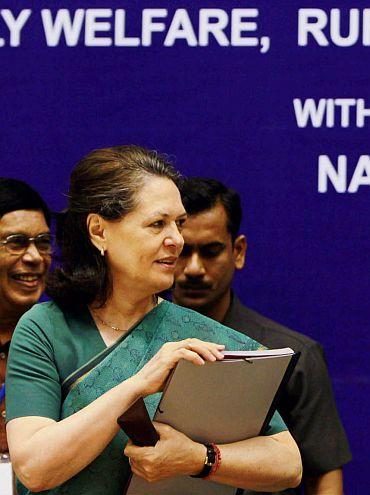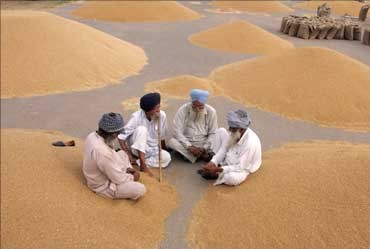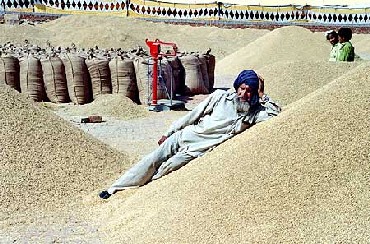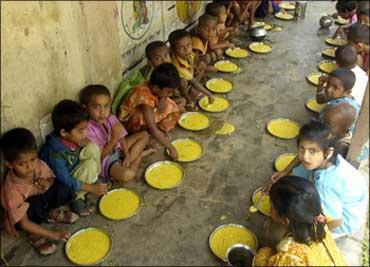Image: The Food Bill is considered to Congress President Sonia Gandhi's pet project
Aiming to provide food security to the poor, the government today approved food bill that seeks to give legal entitlement of cheaper food grains to 63.5 per cent of the country's population. The Cabinet, presided by Prime Minister Manmohan Singh, gave green signal to the draft National Food Security Bill after a brief discussion, a senior minister who attended the meeting told the media. The bill will be introduced in Parliament in this winter session.
Last week, the decision on the Bill was deferred due to paucity of time and because of concerns raised by Agriculture Minister Sharad Pawar over huge financial implications.After the Cabinet approval, the Bill is expected to be tabled in Parliament in in the ongoing Parliament session. Once the law is implemented, the food subsidy bill is expected to rise by Rs 27,663 crore at nearly Rs 95,000 crore, while foodgrains requirement would go up to 61 million tonnesfrom 55 million tonnes, as per the Cabinet proposal.
Food Minister K V Thomas had said on Saturday that the total financial liability to implement the law would be Rs 3.5 lakh crore, as funds would be required to raise agriculture production, create storage space and publicity among others.This is a major initiative by the United Progressive Alliance government, and considered to be pet project of Sonia Gandhi, after Mahatma Gandhi National Rural Employment Guarantee Act.
...
Last week, the decision on the Bill was deferred due to paucity of time and because of concerns raised by Agriculture Minister Sharad Pawar over huge financial implications.After the Cabinet approval, the Bill is expected to be tabled in Parliament in in the ongoing Parliament session. Once the law is implemented, the food subsidy bill is expected to rise by Rs 27,663 crore at nearly Rs 95,000 crore, while foodgrains requirement would go up to 61 million tonnesfrom 55 million tonnes, as per the Cabinet proposal.
Food Minister K V Thomas had said on Saturday that the total financial liability to implement the law would be Rs 3.5 lakh crore, as funds would be required to raise agriculture production, create storage space and publicity among others.This is a major initiative by the United Progressive Alliance government, and considered to be pet project of Sonia Gandhi, after Mahatma Gandhi National Rural Employment Guarantee Act.
...
Cabinet clears Sonia's Food Security Bill
Image: The Food Bill will be introduced in winter session of Parliament
The Congress had promised food law in its manifesto for 2009 election and President had announced this in her address to the joint session of Parliament in June 2009. In rural India, up to 75 per cent of the people will be covered, with at least 46 per cent under priority households (which is same as below poverty line families in the existing public distribution system.
Up to 50 per cent of people will be covered in the urban centres, with at least 28 per cent under priority category.The bill seeks to provide 7 kg of rice, wheat and coarse grains to per person per month to priority households at Rs 3, Rs 2 and Rs 1 per kg, respectively. This is much lower than the rate at which foodgrains are currently supplied to poor through ration shops.
Under the present PDS, 35 kg of wheat and rice per month is supplied to 6.52 crore Below Poverty Line families at Rs 4.15 and Rs 5.65/kg, respectively.The general category would get at least 3 kg of grains at a rate not exceeding 50 per cent of the minimum support price.At present, about 11.5 crore Above Poverty Line families get at least 15 kg of wheat and rice per month at Rs 6.10 and Rs 8.30/kg, respectively.The proposed law has been under consideration of an empowered group of ministers, headed by Finance Minister Pranab Mukherjee, since September 2009.
Up to 50 per cent of people will be covered in the urban centres, with at least 28 per cent under priority category.The bill seeks to provide 7 kg of rice, wheat and coarse grains to per person per month to priority households at Rs 3, Rs 2 and Rs 1 per kg, respectively. This is much lower than the rate at which foodgrains are currently supplied to poor through ration shops.
Under the present PDS, 35 kg of wheat and rice per month is supplied to 6.52 crore Below Poverty Line families at Rs 4.15 and Rs 5.65/kg, respectively.The general category would get at least 3 kg of grains at a rate not exceeding 50 per cent of the minimum support price.At present, about 11.5 crore Above Poverty Line families get at least 15 kg of wheat and rice per month at Rs 6.10 and Rs 8.30/kg, respectively.The proposed law has been under consideration of an empowered group of ministers, headed by Finance Minister Pranab Mukherjee, since September 2009.
Cabinet clears Sonia's Food Security Bill
The Sonia Gandhi led National Advisory Council and an expert committee headed by Prime Minister's Economic Advisory Council Chairman C Rangarajan had also submitted their recommendations on the bill. The NAC had recommended legal entitlement to subsidized foodgrains to both priority and general households, covering at least 75 per cent population.
However, the PMEAC had opined that this was not feasible. Instead, they suggested that assured delivery of grains should be restricted to the really needy households and the coverage of the rest should be through an executive order.The draft was placed on the food ministry's website for public comment in September. Based on the comments and suggestions from all the stakeholders including the States, the draft bill was revised and then placed before Cabinet.
The objective of the proposed law is "to provide for food and nutritional security...by ensuring access to adequate quantity of quality food at affordable prices, for people to live a life with dignity".Going by the stated objective, there is a provision of meals to special group such as destitutes, homeless, person living in starvation and disaster affected persons. That apart, there is a great focus on nutritional support to women and children in the bill."Pregnant women and lactating mothers, besides being entitled to nutritious meals, will also receive maternity benefit at Rs 1,000 per month for six months," Thomas had said, adding that children up to eighth class would get meals.
However, the PMEAC had opined that this was not feasible. Instead, they suggested that assured delivery of grains should be restricted to the really needy households and the coverage of the rest should be through an executive order.The draft was placed on the food ministry's website for public comment in September. Based on the comments and suggestions from all the stakeholders including the States, the draft bill was revised and then placed before Cabinet.
The objective of the proposed law is "to provide for food and nutritional security...by ensuring access to adequate quantity of quality food at affordable prices, for people to live a life with dignity".Going by the stated objective, there is a provision of meals to special group such as destitutes, homeless, person living in starvation and disaster affected persons. That apart, there is a great focus on nutritional support to women and children in the bill."Pregnant women and lactating mothers, besides being entitled to nutritious meals, will also receive maternity benefit at Rs 1,000 per month for six months," Thomas had said, adding that children up to eighth class would get meals.
Cabinet clears Sonia's Food Security Bill
On Saturday, the minister had said that the total financial liability of the proposed law would be Rs 3,50,000 crore.The food ministry has suggested that Rs 1,10,600 crore is required to be invested to boost farm production. Another 35,000 crore is needed to strengthen the scheme of Integrated Child Development Services.Besides these, funds would be required to create storage space, publicity, computerisation of PDS, strengthening of department and capacity building among others.
The provision of meals to special group would cost Rs 8,920 crore per annum, while maternity benefits would be tothe tune of Rs 14,512 crore per annum. These are to be shared between Centre and States.Aiming to empower women, the bill proposes that the ration card will be issued to the eldest female member of the family. Among the other key provisions, the bill stipulates that the Centre would reimburse in cash in case of short supply of foodgrains to States because of fall in production on account of natural calamities such as drought and floods.In case of non-supply of foodgrains or meals to entitled person, the concerned State would be required to provide 'food security allowance'.A three-tier grievance redressal mechanism would be set up to deal with issues related to delivery of entitlements.
They are -- District Grievance Redressal Officer, State Food Commission and National Food Commission.The bill provides for penalty up to Rs 5,000 to be imposed on public servants or authority by the National and State Food Commissions if found guilty of non-compliance with the relief recommended by DGRO.
The provision of meals to special group would cost Rs 8,920 crore per annum, while maternity benefits would be tothe tune of Rs 14,512 crore per annum. These are to be shared between Centre and States.Aiming to empower women, the bill proposes that the ration card will be issued to the eldest female member of the family. Among the other key provisions, the bill stipulates that the Centre would reimburse in cash in case of short supply of foodgrains to States because of fall in production on account of natural calamities such as drought and floods.In case of non-supply of foodgrains or meals to entitled person, the concerned State would be required to provide 'food security allowance'.A three-tier grievance redressal mechanism would be set up to deal with issues related to delivery of entitlements.
They are -- District Grievance Redressal Officer, State Food Commission and National Food Commission.The bill provides for penalty up to Rs 5,000 to be imposed on public servants or authority by the National and State Food Commissions if found guilty of non-compliance with the relief recommended by DGRO.





article